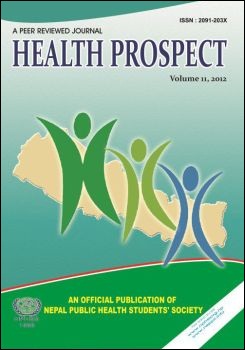Gender Study on Knowledge and Decision Making on Maternal Health Care in Nepal
DOI:
https://doi.org/10.3126/hprospect.v11i0.7421Keywords:
Gender, Maternal Health, Neonatal health, Emergency Obstetric care, danger signs, decision making, gender status, equity and equalityAbstract
Background: The enjoyment of the highest attainable standard of health is one of the fundamental rights of every human being, without distinction of race, religion, and political belief, economic or social condition.(1). There still exist differences in the factors determining health and the burden of ill-health for women and men. The study is based on addressing the maternal health problems with gender perspectives, and the factors associated with health seeking practices. The main objectives of the study are to find out maternal health problem and gender analysis on decision making (household matters and health care) and the knowledge on danger signs in mother and newborn.
Methods:The study is descriptive and cross sectional in design. Household surveys were conducted by the study team in 24 sample VDCs of Baglung, Dolakha and Ramechhap.
Results: A total of 959 women were interviewed and 112 (11.40 percent) of them reported having faced emergency obstetric problems and about 5.6 percent of the respondents were found to be suffering from Uterus prolapse problems. The men were found getting more (81.2 percent) opportunities for education than women (58 percent). Women were found to be limited more to household activities that have low economic/monetary value (Women vs. Men: 41.83 percent Vs 4.49 percent) in comparison to men. The women’s status was found to be lower than that of men in all the indicators. The types of occupation were also clearly distinct between men and women in the study districts. Women had better knowledge (50 percent Vs 25 percent) on danger sign in mother and newborn but did not get opportunity of making decision to access health care in time. They were found having to follow their husband’s or in-laws’s decision.
Conclusion: Appropriate initiative should be taken for women empowerment in order to develop women autonomy for maternal health care.
DOI: http://dx.doi.org/10.3126/hprospect.v11i0.7421
Health Prospect 2012;11:1-6




